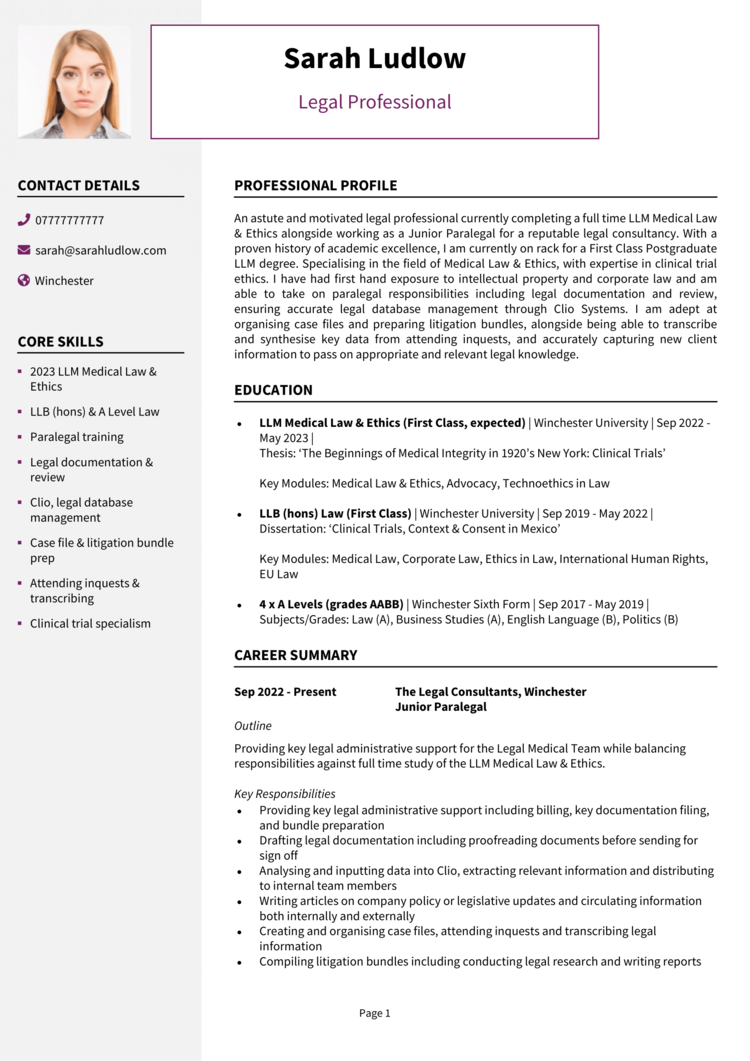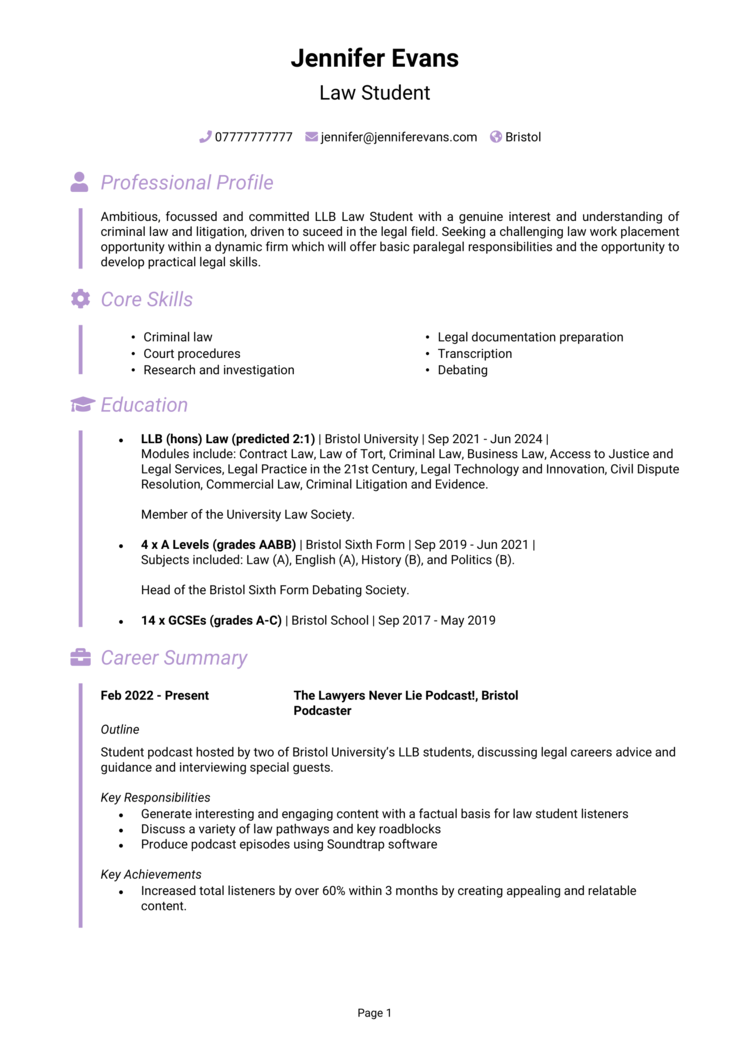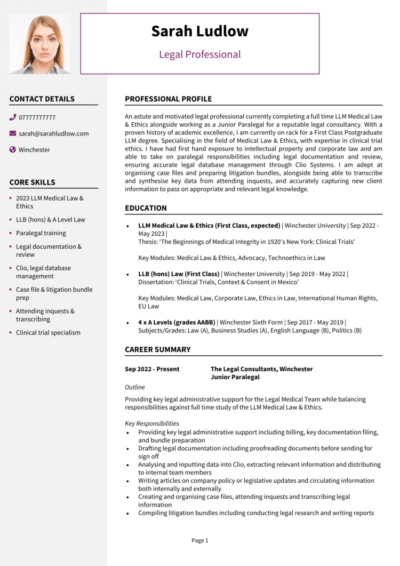Studying law takes discipline, analytical thinking, and an eye for detail – but before you can argue your case in a courtroom, you’ll need to make a strong case for yourself with a well-structured CV.
A disorganised CV won’t do you any favours in an industry built on precision. This guide includes law student CV examples and expert advice to help you write an application that secures interviews.
Law Student CV sample

Law Student with no experience

How to write your Law Student CV
Learn how to create your own interview-winning Law Student CV with this simple step-by-step guide.
This guide walks you through every step, from structuring and writing a CV correctly to crafting compelling content that highlights your academic achievements, legal experience, and research skills, even if this is your first CV. By the end, you’ll have a CV that presents your qualifications as clearly as a well-drafted contract.
Law Student CV structure


A law graduate’s CV needs to be as precise and well-structured as a legal argument. If it lacks clarity or buries the important details in fine print, a hiring manager might dismiss your application faster than an inadmissible piece of evidence. A logical CV structure will ensure that they can find exactly what they need.
Here’s the structure to follow:
- Name and personal details – Keep your contact details at the top so employers can easily reach you; you’ve also got the option to have a picture of yourself – but it’s up to you.
- Profile – Open with a strong summary that highlights your legal knowledge, research skills, and aspirations.
- Core skills – Provide a concise list of your most relevant legal abilities, such as case research, legal drafting, and contract analysis.
- Work experience – Present your professional history in reverse chronological order, covering any legal placements, internships, or relevant experience.
- Education – List your degrees and legal qualifications in reverse order, starting with your most recent.
- Additional info – If applicable, include legal memberships, awards, relevant voluntary work, or relevant hobbies.
Law Student CV format


Legal professionals deal with documents that must be well-structured and easy to read, and your CV format should reflect that same level of organisation. Legal professionals don’t have time to sift through a bad layout full of unnecessary details, and neither do recruiters. If your CV looks like a 200-page case file, they won’t bother digging for the good stuff.
Keep these formatting tips in mind:
- Bullet points – Make your responsibilities and achievements quick to scan.
- Divide sections – Keep everything well-organised so that your CV flows logically.
- Use a clear and readable font – Professionalism is key, so choose a simple, legible font.
- No more than 2 pages – Be concise in length while ensuring your key skills and experience are covered.
Law Student CV profile


Your CV profile is like an opening statement – it should be clear, persuasive, and set up the case for why you’re the best candidate.
Unlike a real opening statement, though, you only get a few sentences, so make them count. It should give recruiters a clear snapshot of your legal expertise and career aspirations.
As a junior candidate, you would benefit more from a longer personal statement, along with a cover letter to back up your application.
Law Student CV profile examples
Profile 1
Dedicated Law Student with hands-on experience gained through shadowing placements and legal assistant roles. Skilled in legal research, drafting case summaries, and supporting client meetings in high-pressure environments. Proficient in Microsoft Office, legal database research, and case management software. Passionate about litigation and regulatory compliance, with a strong attention to detail and problem-solving ability.
Profile 2
Ambitious Law Student with a passion for human rights and public law, demonstrated through involvement in university mooting competitions and pro bono work. Experienced in assisting solicitors with case management, client intake, and legal research. Adept at reviewing legal documents, preparing reports, and handling confidential information with discretion. Eager to further develop practical legal experience in a dynamic legal environment.
What to include in your Law Student CV profile
A strong profile should consider the following:
- Where you’ve studied or worked – Highlight any legal internships, placements, or relevant work experience.
- Your top qualifications – If you’re studying for an LLB, LPC, or SQE, make sure this is clearly stated.
- Key legal skills – Emphasise abilities such as legal research, contract drafting, or case analysis.
- Relevant areas of law – Mention your areas of interest, whether it’s commercial law, human rights, or corporate litigation.
- Professional development – If you’ve attended legal workshops, networking events, or additional training, include them in your CV profile.
How to present your core skills section properly


A core CV skills section is an effective way to showcase your strongest legal abilities at a glance. Think of it as a case summary – highlighting key strengths before getting into the details.
Customise this section to the specific role, ensuring that the listed skills align with the employer’s requirements.
Most valuable skills for a Law Student CV
- Legal Research – Analysing case law, statutes, and legal precedents to support academic work and case preparation.
- Case Briefing – Summarising and interpreting judicial decisions to understand key legal principles and rulings.
- Legal Writing – Drafting essays, memos, and case analyses with clarity, precision, and proper citation.
- Moot Court Advocacy – Presenting legal arguments in simulated court settings to develop litigation and public speaking skills.
- Contract Analysis – Reviewing and interpreting contractual terms to identify obligations, rights, and potential legal issues.
- Statutory Interpretation – Applying rules of interpretation to understand legislative intent and legal applicability.
- Legal Ethics and Professional Responsibility – Understanding and adhering to ethical guidelines governing legal practice.
- Client Interviewing – Conducting structured interviews to gather relevant facts and assess legal issues.
- Alternative Dispute Resolution – Gaining knowledge of mediation, arbitration, and negotiation techniques.
- Legal Technology Proficiency – Using tools like Westlaw, LexisNexis, and document management systems for legal research and drafting.
Structuring your education section


Your education section should clearly list your legal qualifications, from degrees to diplomas. Since law is an academic-heavy profession, this section will hold more weight than in other industries.
If you’re early in your career, highlight relevant coursework, dissertation topics, or research projects that demonstrate your legal knowledge.
List your qualifications in reverse chronological order, starting with the most recent.
Example education sections
Education 1
Distinction LLM International Law | King’s College London | 2023–2024
Modules included Human Rights Law, International Trade Law, and Legal Research Methods. Completed a dissertation on the impact of international arbitration on cross-border commercial disputes, earning a distinction.
First Class LLB (Hons) Law | University of Birmingham | 2020–2023
Modules included Contract Law, Criminal Law, and Corporate Governance. Completed a research project on the effectiveness of judicial review in holding public bodies accountable, achieving a first.
3x A-Levels (AAA) | Manchester Sixth Form College | 2018–2020
9x GCSEs (A*-C) | Manchester High School | 2016–2018
Education 2
Merit LLM Corporate and Commercial Law | University of Bristol | 2023–2024
Modules included Company Law, Mergers and Acquisitions, and Financial Regulation. Completed a dissertation on the role of directors’ duties in preventing corporate misconduct, achieving a merit.
Upper Second Class (2:1) LLB (Hons) Law | University of Nottingham | 2019–2022
Modules included Equity and Trusts, EU Law, and Intellectual Property Law. Completed a dissertation on the effectiveness of GDPR in regulating online data privacy.
3x A-Levels (ABB) | Sheffield City College | 2017–2019
9x GCSEs (A*-C) | Sheffield Academy | 2015–2017
What to include in your education section
For each qualification, add the following info:
- Qualification & organisation – Tell the recruiter what you studied and where.
- Dates studied – State when you started and finished the course.
- Extra details – Highlight specific, pertinent modules if they really back up your application. Add a sentence or two expanding upon them beneath the relevant qualification.
Best qualifications for Law Students
- LLB (Bachelor of Laws) – The primary undergraduate qualification required to pursue a legal career in the UK.
- Legal Practice Course (LPC) – Essential for aspiring solicitors, covering practical aspects of working in a law firm.
- Bar Training Course (BTC) – A necessary qualification for those aiming to become barristers.
- SQE (Solicitors Qualifying Examination) – The new route to qualifying as a solicitor, replacing the LPC.
- CILEx Professional Qualification (CPQ) – An alternative legal qualification that allows for qualification as a chartered legal executive.
Describing your work experience


Your work experience is the evidence that backs up your case. Listing skills is great, but recruiters want to see how you’ve actually put them into practice – otherwise, it’s just speculation.
List your roles in reverse chronological order, starting with the most recent. If you don’t have extensive legal experience, highlight internships, pro bono work, legal research roles, or even transferable skills from non-legal jobs.
The best way to structure job entries on your CV

- Outline – Introduce the employer and the nature of the organisation (e.g., a law firm, corporate legal department, or pro bono clinic). Mention your role and how you contributed to the legal team.
- Responsibilities – List your key duties, such as conducting case research, assisting in contract drafting, or preparing client documents. Use action words like analysed, drafted, and advised to bring your experience to life.
- Achievements – Recruiters love quantifiable impact. Did you contribute to a case that won? Improve a research process? Reduce document processing time? Use numbers where you can – because in law, evidence matters.
Example jobs for Law Student
Legal Assistant | Johnson & Clarke LLP
Outline
Worked alongside a team of solicitors in a busy high-street law firm, supporting case preparation and client interactions in family and civil law matters.
Responsibilities
- Drafted correspondence and legal documents, including witness statements and court forms.
- Assisted in the preparation of case files, ensuring all relevant evidence and documentation were compiled.
- Liaised with clients, taking initial instructions and updating them on case progress.
- Scheduled client appointments and managed solicitor calendars to streamline workload.
- Ensured compliance with GDPR and confidentiality regulations in handling sensitive case information.
Achievements
- Helped process over 50 case files efficiently, improving case turnaround times.
- Increased client satisfaction by ensuring timely updates and clear communication.
- Recognised for reliability and ability to handle confidential information with professionalism.
Legal Shadowing Placement | Manchester Crown Court
Outline
Gained first-hand experience of the legal system by shadowing barristers and judges in a criminal court setting.
Responsibilities
- Observed courtroom proceedings, including trials, sentencing hearings, and cross-examinations.
- Reviewed case files and legal arguments to understand case progression and judicial decision-making.
- Engaged in discussions with barristers and solicitors about case strategies and legal procedures.
- Compiled notes on case outcomes and legal precedents for personal learning.
- Assisted court clerks with basic administrative tasks to facilitate courtroom efficiency.
Achievements
- Gained insight into real-world litigation and courtroom advocacy.
- Developed a strong understanding of legal argumentation and judicial reasoning.
- Received a personal commendation from a senior judge for enthusiasm and keen observation.
Additional info


For a law student, the additional info section is especially value: detail anything that might convey that you’re the right fit, from relevant hobbies to past extracurricular commitments.
Good additional info for Law Students
- Hobbies – Engaging in activities like debating, writing, or public speaking can help refine skills essential for a legal career. Analytical hobbies such as chess or strategy games can also demonstrate critical thinking.
- Volunteering – Pro bono work, legal aid assistance, or community outreach highlight a commitment to justice and hands-on experience with legal issues.
- Awards and Competitions – Achievements in mooting, debating, or legal essay competitions demonstrate strong advocacy, research, and analytical abilities.
- Extracurricular Activities – Involvement in student law societies, leadership roles, or university committees showcases teamwork, initiative, and organisation.
- Additional Certifications – Courses on legal subjects or skills like mediation, compliance, or research methods show a proactive approach to professional development.
Additional info example
Additional info
Hobbies and Interests
Mooting competitions – Developed advocacy skills through structured arguments and rebuttals in simulated court proceedings.
Legal blogging – Published articles analysing landmark cases and legal reforms to refine research and writing abilities.
Theatre – Participated in student productions, improving confidence, articulation, and stage presence—useful for courtroom advocacy.
Volunteer Work
Pro bono legal clinic assistant – Assisted with case research and client interviews, gaining exposure to real-world legal issues.
Citizens Advice volunteer – Provided guidance on housing and employment law, improving communication and problem-solving skills.
Extracurricular Activities
Law Society committee member – Organised networking events and talks with legal professionals, developing event management and leadership skills.
Debate club president – Led a team to national debating championships, honing critical thinking and persuasive argumentation.
Certifications and Training
Introduction to Contract Law (HarvardX) – Explored fundamental contract principles, strengthening legal knowledge.
Alternative Dispute Resolution (CPD-accredited) – Gained insights into mediation and arbitration as dispute resolution methods.
Languages
French – Assisted with translating legal documents for an internship with an international firm.
Mandarin – Basic conversational proficiency, with ongoing study to enhance fluency for global legal work.





